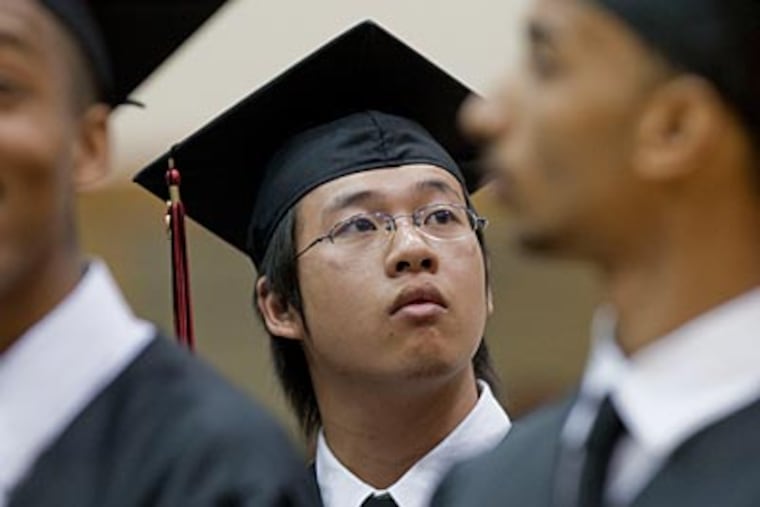At South Philadelphia High, an upbeat end to a tumultuous year
Balloons, flowers, hugs, and handshakes greeted the 2010 graduates of South Philadelphia High on Tuesday, providing an upbeat, colorful ending to a school year defined by the racial violence of Dec. 3.

Balloons, flowers, hugs, and handshakes greeted the 2010 graduates of South Philadelphia High on Tuesday, providing an upbeat, colorful ending to a school year defined by the racial violence of Dec. 3.
Philadelphia Schools Superintendent Arlene Ackerman, who normally forgoes graduation ceremonies, made a special trip to attend, telling the seniors they had endured "an unusually difficult year."
Like other speakers, she did not directly acknowledge the day of unprecedented violence when 30 Asian students were attacked by groups of mostly African American classmates. The assaults sent seven Asians to hospitals and sparked three separate investigations.
"I feel like we've been through a lot," Ackerman told the audience, explaining why she wanted to attend.
She asked members of the Student Ambassadors and the 50-50 Club, which promote cultural understanding, to stand and be acknowledged by applause. Those students "help bring different cultures together in a positive and productive way," Ackerman said.
Others say they support that effort - but want their own hard experience recognized.
Graduating senior Duong Ly said that he was attacked in October 2008 and that his brother was accosted this year.
"My brother is a victim. I'm very upset about it," said Ly, a blue National Honor Society emblem on his gown. The good thing was, "after Dec. 3, we know how to organize," he said.
The guest speaker was incoming principal Otis Hackney III, who told students, "You had a rough year." He urged them to focus on their values and to make independent decisions.
In an interview, Hackney said he hoped graduation would help the school move forward in solving its problems. "It brings closure for these seniors. They had such an up-and-down year, tumultuous at some points."
After Dec. 3, the district installed 126 more security cameras, which students said decreased commotion.
District officials say enormous strides have been made at the school, but Asian groups dispute that, saying administrators have been reluctant to address persistent and systemic bias.
Yesterday, Temple University's McGonigle Hall was crowded with parents, siblings, and friends.
For some students, the violence and the tumult that followed hardly registered. "I didn't have anything to do with that," said senior Shereas Dobbs, who is African American.
For some, the violence hung like a cloud.
"I'm glad to see them graduate after four years. I'm glad they survived," said Xu Lin, an organizer with the Philadelphia Chinatown Development Corp. who attended the graduation. "I regret for those who didn't make it, who dropped out because they couldn't take the violence."
A School District inquiry found race was a contributing factor in all the Dec. 3 attacks, but blamed rumors that followed an altercation between Asian and African American students the previous day. Asian leaders say the inquiry failed to link the violence to years of assaults on Asian students.
The U.S. Justice Department is investigating whether the district discriminated against Asian students. A separate inquiry is being conducted by the state Human Relations Commission.
Senior Wei Chen, who helped lead a weeklong, 50-student boycott of classes after Dec. 3, smiled broadly as he prepared to graduate. "I've done my job - almost done," said Chen.
Senior Greg Henderson, who is African American, said racial tension had made the year difficult, but recently "everything calmed down."
"It's out of my hands," he said, noting the school now belonged to its underclassmen. "The best of luck to them."